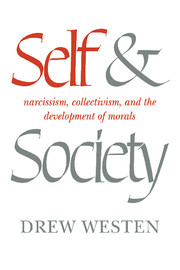Book contents
- Frontmatter
- Contents
- Preface
- Part I A theory of personality
- Part II A theory of culture
- Part III Personality and culture: a synthesis
- 8 Culture and personality: dying species or vigorous hybrid?
- 9 Psychic and sociocultural structure and dynamics
- 10 Personality and communitarian collectivism
- 11 The psychodynamics of modernization
- 12 Personality and sociocultural change
- 13 Breakdown and recovery: paradigmatic processes in personal identity and cultural integration
- 14 Personality and individuation
- References
- Index
12 - Personality and sociocultural change
Published online by Cambridge University Press: 11 November 2009
- Frontmatter
- Contents
- Preface
- Part I A theory of personality
- Part II A theory of culture
- Part III Personality and culture: a synthesis
- 8 Culture and personality: dying species or vigorous hybrid?
- 9 Psychic and sociocultural structure and dynamics
- 10 Personality and communitarian collectivism
- 11 The psychodynamics of modernization
- 12 Personality and sociocultural change
- 13 Breakdown and recovery: paradigmatic processes in personal identity and cultural integration
- 14 Personality and individuation
- References
- Index
Summary
An exploration of the psychological effects of modernization or any form of social change must examine the impact of the various processes on the individuals involved. Living in a nation-state (as opposed to a village community) or tilling the fields with mechanized implements does not necessarily “modernize” the structure of one's personality. A significant problem with many of the studies reviewed in the previous chapter is the implicit assumption that everyone in a “modern” society must be psychologically “modern,” and everyone in a premodern society must have a “premodern” personality. Many of these works ignore important similarities between individuals and groups in modernized and non modernized societies. They seem to assume that the small-town minister and urban philosopher in a modernized society must be psychologically equivalent, that the wealthy landlord and marginal peasant must have the same needs and concerns, and that the tribal warrior is somehow different from the modern soldier in motivation or rationality.
The present chapter will explore the relation between personality processes and a central aspect of modernization (and social change in general), the experience of the breakdown of shared structures of meaning. It will then examine a specific case, of a disrupted funeral ritual in Java in changing times, in order to demonstrate the utility of the approach being offered here.
The reader will forgive, I hope, an inattention in the present work to the impact on personality of exploitation, civil war, torture, and other experiences confronting people in the Third World, for whom class conflict, power struggles among elites, and unwitting enmeshment in a global struggle between imperialistic superpowers are at least as important influences on their lives as modernization.
- Type
- Chapter
- Information
- Self and SocietyNarcissism, Collectivism, and the Development of Morals, pp. 355 - 366Publisher: Cambridge University PressPrint publication year: 1985

